TPACK Part 1: An overview
In a previous post I mentioned reading through Matt
Bower's Design of
technology-enhanced learning, and how more posts would likely be sparked by it. Bower's
second chapter prompted this post, as, he rightly points out, TPACK
"highlights the interconnected nature of key dimensions of
technology-enhanced learning" (p.20). This is the first of two posts, 1) explaining TPACK and 2) suggesting a nuance to it for the purposes of open and distance education (ODE) and effective TEL.
If you're unfamiliar with TPACK there are various introductions on YouTube, with options depending on how much of a hurry you're in. There is TPACK in 3 Minutes; TPACK in 2 minutes; and, what looks to be the record holder for brevity, a 1:49 introduction. This somewhat longer clip by Matthew Koehler provides a very useful history of its development, and introduces its open future.
A very useful
reference website for TPACK is that of Matthew Koehler: http://matt-koehler.com/tpack2/. The
website includes links to publications, theses and presentations that continue
to emerge as the framework develops. The community and scale of work around
TPACK is very impressive, and Koehler is extremely generous in his activity.
For example there is a Mendeley group
that anyone can join for research purposes, and the diagram to the left is rights
free from matt-koehler.com/tpack2/using-the-tpack-image/.
The Contexts element
of the model, added later in its development, is actually key to applying the
entire framework. In the next post, which this post serves as an introduction
to, I'd like to suggest how TPACK might be applied to ODE in tertiary formal contexts.
If you're unfamiliar with TPACK there are various introductions on YouTube, with options depending on how much of a hurry you're in. There is TPACK in 3 Minutes; TPACK in 2 minutes; and, what looks to be the record holder for brevity, a 1:49 introduction. This somewhat longer clip by Matthew Koehler provides a very useful history of its development, and introduces its open future.
 |
| Reproduced by permission of the publisher, © 2012 by tpack.org |
As the diagram
illustrates TPACK is primarily a framework concerned with how teachers might
combine Technology (the partner), Pedagogy (the how) And Content Knowledge
(the what) in support of good teaching. As a framework, I think it's extremely elegant. The multiplying articles, presentations, social media artifacts and communities following its development shows that it has clearly struck a chord across educators in all sectors.
What follows is my own shorthand for the framework. For a more authoritative description take a look at Koehler's overview, the 2006 Mishar & Koehler paper "Technological Pedagogical Content Knowledge: A Framework for Teacher Knowledge", and/or the edited book "Handbook of Technological Pedagogical Content Knowledge (TPACK) for Educators".
What follows is my own shorthand for the framework. For a more authoritative description take a look at Koehler's overview, the 2006 Mishar & Koehler paper "Technological Pedagogical Content Knowledge: A Framework for Teacher Knowledge", and/or the edited book "Handbook of Technological Pedagogical Content Knowledge (TPACK) for Educators".
There are three main
elements to the framework, presented as primary forms of knowledge:
- Technology Knowledge (TK): what the teacher knows about working with and applying technology.
- Pedagogical Knowledge (PK): what the teacher knows about teaching method and practice.
- Content Knowledge (CK): what the teacher knows about the subject.
So far, so good.
Where TPACK really comes into its own is in where these three elements overlap
in pairs shown in the diagram as TPK, TCK, and PCK, and the so-called 'sweet
spot' in the centre (TPACK). From an online learning perspective TPK, TCK and
PCK clearly fall short of the mark. The three acronyms provide a useful
shorthand for anything in the online education realm that simply does not work
as well as it might. The goal for all TEL practitioners and online educators is
the nirvana of TPACK, where Technology, Pedagogy And Content Knowledge all synergise into an optimal learning experience for the student.

Comments
Post a Comment